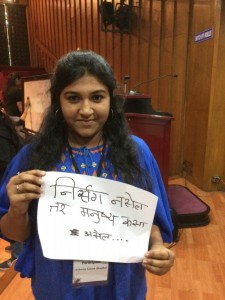One of my fondest memories growing up in the lap of Kashmir’s most beautiful valleys was strolling through my friend, Aashiq’s apple orchards. One chilly autumn morning, almost 15 years ago now, I remember Aashiq sowing an apple seed into the earth. As he covered it carefully with a handful of soil he turned around and told me “Munib, I need to take care of this seed now… nurture it, nourish it, water it, safeguard it from pests, and only after 12 years, 12 long years of work, will it start bearing its first fruit”. I internalized those words that morning and even today, 1.5 decades on, I find it hard for them to leave me. I guess the message was clear, if we want to achieve something in life, we must not only nurture but also persevere.
My mind was as far away from apples as can possibly be on the afternoon of 29th September, 2018. I, along with Professor E.J. Milner-Gulland, was conducting a workshop on “Conservation Optimism” at the Student Conference for Conservation Sciences (SCCS) in Bengaluru. It was lovely to see a good turn-out. After E.J. gave an in-depth overview of what Conservation Optimism stands for and some of its key aspects such as ConservationNOW and KeyConservation, the audience seemed visibly more in tuned to what this catchy phrase was really all about.
The workshop then took a fun turn as we descended into multiple activities. The participants were warmed up by writing one point each as to why they thought conservation optimism was a positive and a negative thing. Themes of it being “too hard” or “idealistic” or “not applicable in the real world” dominated the negatives, whilst it being a “uniting force” or “extremely motivating and empowering” or “there is no other way to do conservation effectively” dominated the positives. Even though the workshop cohort was made up of rather young and relatively inexperienced members of the scientific community, they clearly knew what they were talking about.
As we then navigated through group discussions on the applicability of conservation optimism as a movement and the possibility of having a conservation optimism summit in India, it was clear that we face many challenges. Groups spoke about the difficulty in reaching audiences that speak more languages than is perhaps logistically possible. Or the massive budget one may need to actually make this idea a reality. There were concerns over how we can make the voice of that one person sitting atop 5,400 m in the remotest parts of Indian Trans-Himalayas doing his bit to safeguard snow leopards from being killed by local communities, be heard alongside the voice of a respected scientist working out of one of India’s leading wildlife research and conservation NGOs. It is hard to be a conservation optimist, in a country of a billion people and several billion more problems, right?
With everything meaningful, there will always be challenges. Nonetheless, as the clock was ticking towards the close of the workshop, we asked the participants to take a step back, reflect and ask themselves: “Why are you a conservation optimist?” Seeing the ponderous faces translate into ones with wide smiles upon answering this question internally, I could see not only people who knew the answer to this question, but ones that truly believed in it as well. As each individual participant took their turn to write their answers on a blackboard and take photos of themselves, I saw young people feeling inspired by their own thoughts.

That afternoon, I felt a seed, much like the apple seed that Aashiq had sown in my childhood, was sown. A seed that has opened those young minds, including my own, to the realities of conservation optimism and I am thrilled to ride on this momentum of positivity and ensure that our synergies come together towards a much needed conservation optimism summit in India, a country that I love. If a billion people can stand up for a cause and help each other in achieving it, the world can truly change for the better. I know this sounds borderline idealistic, but hey, I am a conservation optimist, and there is no better way to fight our world’s problems!
As a part of the workshop we wrote messages in the spirit of conservation optimism to the world’s leaders!
The message on top is in Marathi (a language spoken in the western India state of Maharashtra) it reads “If nature won’t exist, how will humans?”


